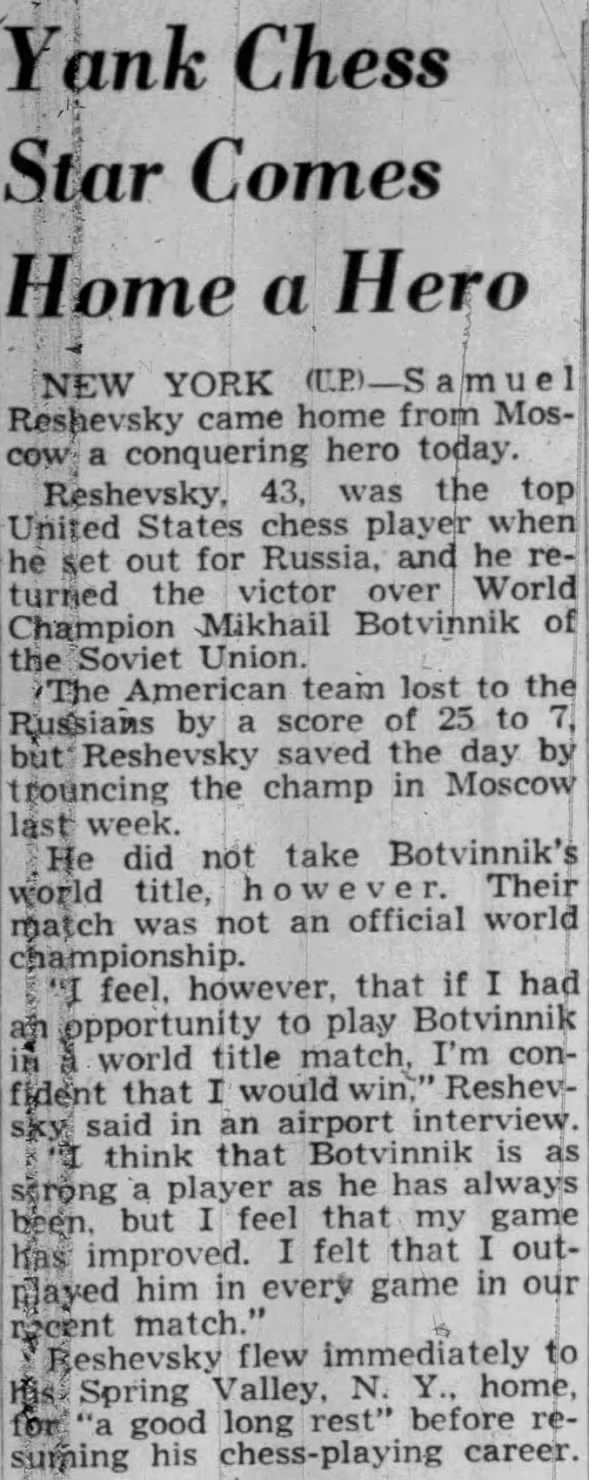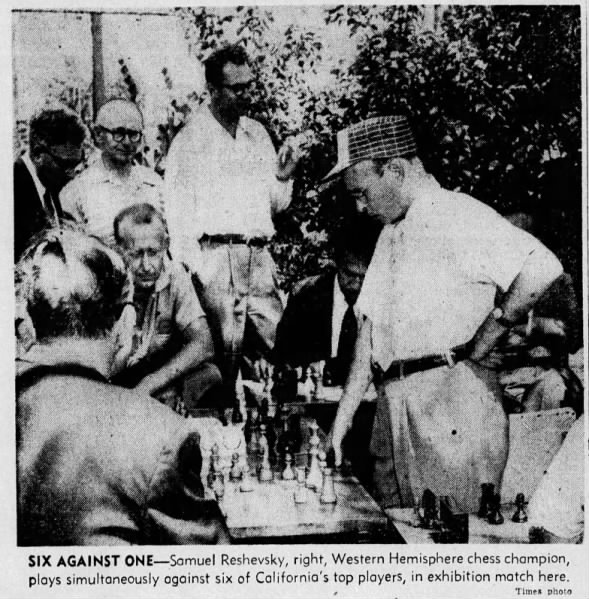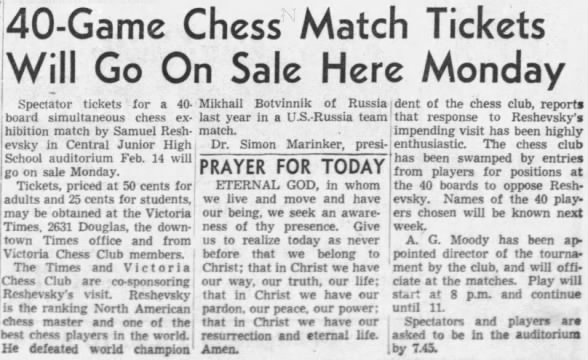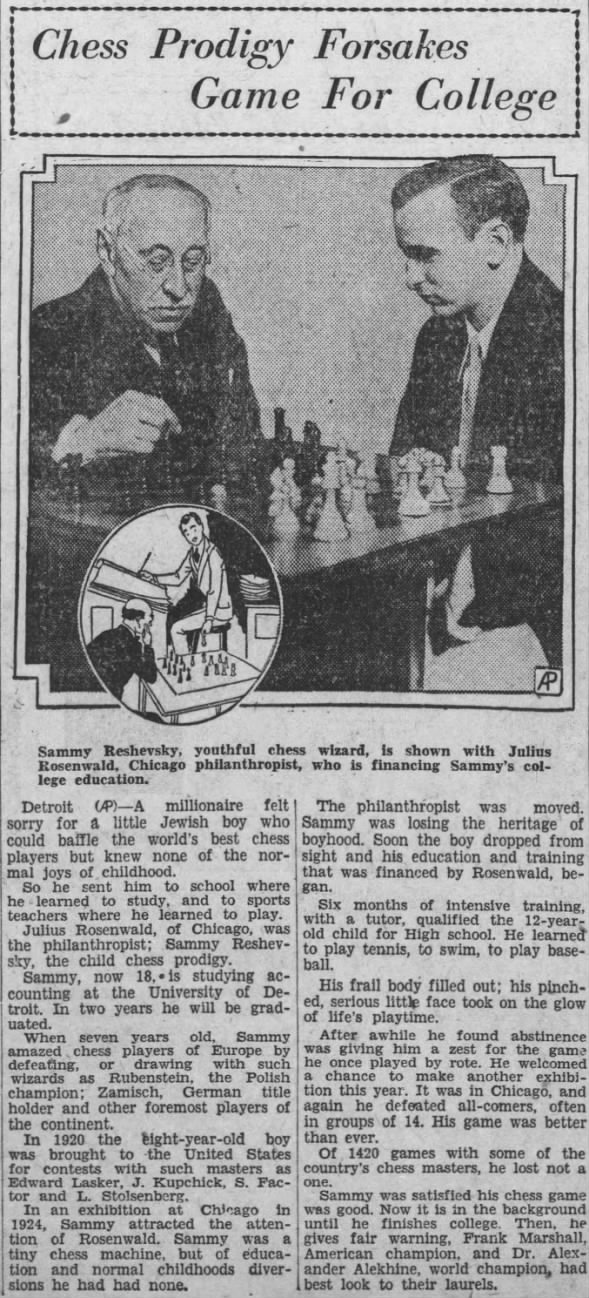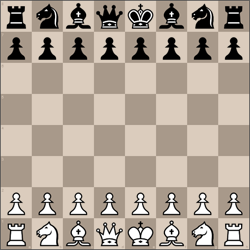Back to Home Index
August 05 1945
The Los Angeles Times, Los Angeles, California, Sunday, August 05, 1945
1945. The Champs—Two giants of the chess world, Samuel Reshevsky, left, and Reuben Fine, will match wits here Tuesday evening in the Pan-American Chess Congress.

Chess Masters Enter Final Week of Tourney
With United States leading in the $3600 masters tournament, the Pan-American Chess Congress, conducted by the California Chess Association and sponsored by The Times, will go into its final week today. Seven rounds have been played and six more will be run off.
The final matches, will played Saturday and on Sunday the champion of the Western Hemisphere will be crowned at a banquet at which prizes will be awarded winners in all the groups participating in tournaments at the Hollywood Athletic Club.
The 13 masters' pot of $3600 will be divided into eight prizes as follows: first, $1000; second, $750; third, $500; fourth, $400; fifth, $350; sixth, $250; seventh, $200; and eighth, $150. In addition brilliancy prizes totaling nearly $150 have been offered by individuals interested in spurring the masters to their best efforts.
Will the winner of the masters tournament be either Reuben Fine or Samuel Reshevsky? With both tied for the lead with scores of 5-0, informed circles expect one of them to be the champion and interest is high in their match scheduled for Tuesday at 7 p.m. Fine will have white but Reshevsky says color means nothing when two masters of approximately equal strength play. White has choice of opening but that's all. These two wizards have not met for several years and a masterpiece of the royal game is looked for by chess lovers throughout the world. The wire services are carrying daily results of the games.
Herman Steiner, Times chess editor, and Weaver W. Adams yesterday agreed to call their adjourned game of Friday night a draw.
In last night's matches, Maj. Jose Joaquin Araiza, Mexico, met Isaac Kashdan (or Irving Rivise?), U.S.; Fine met Steiner; Hector D. Rossetto, Argentina, met Adams; I. A. Horowitz, U.S., played Dr. Walter O. Cruz, Brazil; Dr. Jose Alfredo Brodermann, Cuba, met Joaquin Camarena, Mexico, and Pfc. Herbert Seidman, U.S., met Herman Pilnik, Argentina. Reshevsky drew a bye.
Borochow in Lead
Harry Borochow, former California State champion, is leading the Masters Reserves tournament with a score of 5½-1½. Next to him are George E. Croy and Charles Jarrell, tied at 4½-1½.
In today's pairings Fine will meet Kashdan, while Reshevsky will clash with Araiza.
Other matches today will be as follows, all games to begin at 2 p.m.: Camarena vs. Seidman; Cruz vs. Brodermann; Adams vs. Horowitz; Steiner vs. Rossetto, and Pilnik draws a bye.
Tomorrow is an open day in which postponed games will be played off at 2 to 6 p.m. and 7 to 11 p.m. Beginning Tuesday master games will be played at 7 p.m. daily with adjourned games being played off at 2 p.m.
The Pan-American visitors while in the city have been extended the courtesies of the Hollywood Athletic Club as well as those of several other Southland clubs.
Prizes in the reserves, women's and other tournaments will be cups, plaques, medals and scrolls.
Chess Galore to See
Aside from the closing day's banquet at 8 p.m. next Sunday, the feature of the day will be a game with living pieces to be played in the club gymnasium. It is hoped to have some outstanding Hollywood celebrities for king and queen and the pawns will be filmland cuties. One of the national magazines is expected to photograph this unique game and newsreels may be taken of it.
With approximately 80 persons playing in the various tournaments making up the Pan-American Congress, some 40 boards are in operation at nearly all times and there is chess galore for the spectators to watch. The master games are reproduced on huge charts on the wall. Many spectators take pocket sets with them on which they follow the moves of the masters.
But with all the diversified attractions in the club's huge gymnasium, chief interest centers on the games of Fine and Reshevsky with a goodly and loyal faction centering its attention on Los Angeles' own popular Herman Steiner.
August 07 1945
 Reshevsky To Oppose Fine at Chess Tonight 07 Aug 1945, Tue The Los Angeles Times (Los Angeles, California) Newspapers.com
Reshevsky To Oppose Fine at Chess Tonight 07 Aug 1945, Tue The Los Angeles Times (Los Angeles, California) Newspapers.com
Reshevsky to Oppose Fine at Chess Tonight
With both Samuel Reshevsky and Reuben Fine still toppling over all opposition like a queen rampant in a field of scattered pawns, these two chess grand masters will crash head on into each other tonight in the Pan-American Chess Congress.
Fine, after winning his adjourned game from Irving Kashdan in 63 moves Sunday night when he was on the verge of queening a pawn, had no game scheduled yesterday at the Hollywood Athletic Club where this Times-sponsored tournament is nightly drawing crowds of chess lovers.
Reshevsky also won Sunday, defeating Maj. Jose Joaquin Araiza of Mexico in 40 moves.
Last night he met Dr. Walter O. Cruz in a game postponed from the third round because of the Brazilian's late arrival. Reshevsky won in 33 moves.
Herman Pilnik, Argentina, last night defeated Araiza in 43 moves and Kashdan took Weaver W. Adams in 36 moves.
Game Adjourned
The game between Cruz and Dr. Jose Alfredo Brodermann, Cuba, was adjourned until yesterday afternoon when Brodermann won on his 60th move.
Kashdan and Araiza, playing off a game adjourned from Saturday, battled for another four hours yesterday and, at 6 p.m. adjourned the game for a second time. With 80 moves already made, this marathon may prove to be the longest game of the tournament. Kashdan also played the shortest, winning from Camarena on opening night in 15 moves.
Tonight's Fine-Reshevsky match, as well as all the other games, some 40 boards in all, will begin at 7. Tickets may be purchased at the door and no reservations are necessary.
Other matches tonight will be: Rossetto vs. Kashdan; Horowitz vs. Steiner; Brodermann vs. Adams; Seidman vs. Cruz, and Pilnik vs. Camarena. The first named plays white in all cases. Araiza drew a bye. This will be the ninth round with four more to go after tonight.
Janss Wins
The U.S.S Maritime Service made a clean sweep over the Army when Ed Janss Jr. won each encounter in his five-game match with Sgt. Dan Meyers.
In the masters reserves tournament Harry Borochow, former State champion, leads the field of 18 players with a score of 8½-2½. Closely bunched behind him are Paul Quillen, 7-5; E. F. Shrader, 6½-4½; Adolf Weiss, 6½-4½; George E. Croy, 6-2, and S. Wolff, 6-4.
The women also had an open schedule yesterday. In Sunday's games Mrs. Blanche Berkov upset Mrs. Matilda Harmat; Mrs. Hilda Look defeated Mrs. Florence Rogers and Miss N. May Karff of New York, and Mrs. Nanny Roos, official photographer of the chess congress, fought to a draw.
Last night Miss Karff won an adjourned game from Mrs. Harmat.
August 08 1945
The Los Angeles Times, Los Angeles, California, Wednesday, August 08, 1945
STARS IN THROES OF BATTLE—Spectators watch match of Samuel Reshevsky (left) and Reuben Fine for championship of Pan-American chess tourney. It ended in draw.

 Feature Chess Tourney Match Results in Draw 08 Aug 1945, Wed The Los Angeles Times (Los Angeles, California) Newspapers.com
Feature Chess Tourney Match Results in Draw 08 Aug 1945, Wed The Los Angeles Times (Los Angeles, California) Newspapers.com
Feature Chess Tourney Match Results in Draw
The long-awaited battle of the chess giants, Samuel Reshevsky and Reuben Fine, ended in a draw last night as the play in the masters tournament of the Pan-American Chess Congress went into the ninth round at the Hollywood Athletic Club.
The draw leaves Reshevsky and Fine tied for leadership in the tournament.
Other Results
In other games last night Isaac Kashdan defeated Hector D. Rossetto in 53 moves, I. A. Horowitz bested Herman Steiner in 42 moves. Weaver W. Adams won from Dr. J. A. Brodermann in 30 plays. Pfc. Herbert Seidman and Dr. Walter Cruz drew while Herman Pilnick won from Joaquin Camarena in 31 moves.
In the women's tournament, Mrs. Lynn Henderson won from Mrs. Florence Rogers, Mrs. Matilda Harmat and Mrs. Alma Wolff drew, Miss N. May Karff bested Mrs. Hilda Look and in an earlier game Miss Karff also defeated Mrs. Blanche Berkov.
Masters Reserve
Leading the masters reserve tournament was Harry Borochow, former State champion, with a score of 8½ to 2½. Robert Solana is next with 8½ to 3½.
The longest game of the tournament, between Maj. Jose Joaquin Araiza and Isaac Kashdan, ended in a draw after 101 moves yesterday afternoon after nine and a half hours of actual play. The marathon, begun in the seventh round Saturday night, was adjourned after four hours. Resumed Monday afternoon, the game was adjourned after four hours of wood pushing and yesterday, unable to reach a decision, the masters agreed to a draw.
In startling contrast to the Araiza-Kashdan marathon was Monday night's most sensational game when Robert Solana, Cuban, one of the leaders in the field of 18 reserve masters, dropped an atomic bomb on his Mexican opponent, Antonio Higuera. Solana checkmated his unlucky foe in just three moves.
How It Was Done
It was almost the classical Scholar's Mate. Just one of those things that shouldn't happen even to beginners but it actually took place and here's the score to prove it:
BIRDS OPENING
12th round Masters Reserves
Higuera, Mexico &nbasp; Solana, Cuba
1. P-KB4 P-K4
2. P-KN3 PxP
3. PxP Q-R5mate!
Previously there had been a 10-move mate in the masters reserves tourney when Jay Chernis blitzed F. Hufnagel. But now Solana holds the brevity record and Higuera is still wondering what hit him.
STANDINGS OF THE MASTERS
W. L. D. Score
Reuben Fine . . . . . 7 0 1 7½-½
Samuel Reshevsky . . 7 0 1 7½-½
I. A. Horowitz . . . 5 1 2 6 - 2
Hector D. Rossetto. . 4 3 1 4½ - 3½
Herman Pilnick . . . 4 1 1 4½ - 1½
Isaac Kashdan . . . . 4 2 1 4½ - 2½
Maj. J. J. Araiza . . 2 3 2 3 - 4
Weaver W. Adams . . . 3 4 1 3½ - 4½
Pfc. H. Seidman . . . 2 4 2 3 - 5
Dr. J. A. Brodermann. 1 5 1 1½ - 5½
Herman Steiner . . . 1 5 1 1½ - 5½
Dr. Walter D. Cruz . 0 4 4 2 - 6
Joaquin Camarena . . 0 8 1 ½ - 8½
HOW WOMEN STAND
Standings of the women after the seventh round:
W. L. D. Score
Mrs. Nanny Roos . . . 5 0 1 5½ - ½
Mrs. Blanche Berkov . 4 2 0 4 - 2
Mrs. Mary Bain . . . 3 0 1 3½ - ½
Miss N. May Karff . . 5 0 1 5½ - ½
Mrs. Hilda Look . . . 3 3 0 3 - 3
Mrs. Matilda Harmat . 1 3 2 2 - 4
Mrs. Alma Wolff . . . 1 3 1 1 - 3½
Mrs. Lyn Henderson . 1 5 0 1 - 5
Mrs. Florence Rogers. 0 7 0 0 - 7















